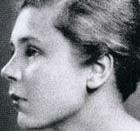Elizabeth Bishop is an intriguing and enigmatic poet whose poetic voice is distinct and individualistic. In many ways Derek Mahon's assessment of Bishop as "the shy perfectionist with her painter's eye", is her most fitting and apt legacy. Bishop's work is replete with vivid imagery and striking metaphors and the keenness of her perception of the world around her is remarkable. Her poetry is carefully wrought often combining rich and detailed imagery with thematic indirectness. In my opinion, Bishop is a poet of the ordinary, the mundane and the banal, who writes about the universal themes of loss, loneliness, belonging and pain. We often search Bishop's poetry to understand her life and we use her life to understand her poetry. An outsider for much of her life, much of her work is focused on her struggles with herself and the rest of the world. Her depression, alcoholism, sexuality and her relationship with her parents all compounded to the poets alienation and desire to belong, and it is this sense of never belonging that is so eloquently captured in much of her most poignant and memorable poems.
Much of Bishop's work is preoccupied with motherhood, the role of the mother, her presence and influence, sometimes in the most unlikely of places. On a denotative level, 'Filling Station' is a descriptive but trivial and charming little appreciation of motherhood. On a connotative level, however, the poem may be interpreted as an allegory of human life, in which the filling station is a microcosm of the sordidness and squalor of the world. Any attempts to decorate of adorn this world may be as Patrick Murray argues, "a metaphor for our early efforts to find beauty out of ugliness and aesthetic harmony out of randomness". We strive to distinguish between beauty and ugliness.


